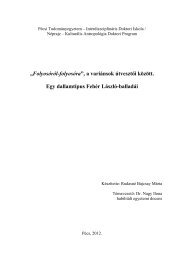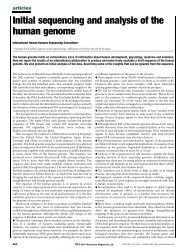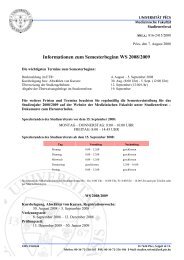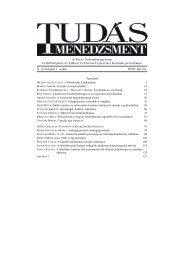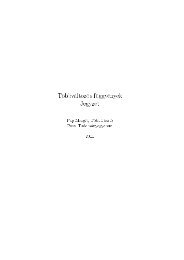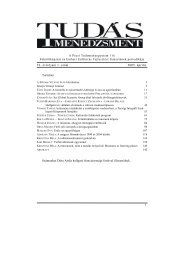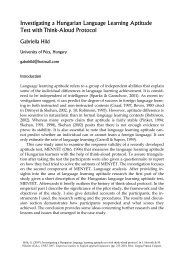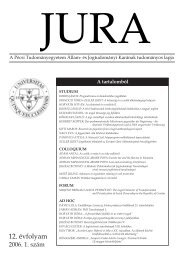Predictors of Foreign-Language Anxiety: Examining the ...
Predictors of Foreign-Language Anxiety: Examining the ...
Predictors of Foreign-Language Anxiety: Examining the ...
Create successful ePaper yourself
Turn your PDF publications into a flip-book with our unique Google optimized e-Paper software.
pr<strong>of</strong>iciency scores <strong>of</strong> learners with high levels <strong>of</strong> anxiety are attributable to <strong>the</strong>negative effects anxiety exerts on L2 learning and performance (MacIntyre, 1995a,b, 1999, 2002; MacIntyre & Gardner, 1991b, 1994a, b; Horwitz, 2000, 2001), including(1) cognitive effects, as proposed by <strong>the</strong> cognitive interference model <strong>of</strong> anxiety(Eysenck, 1979; Sarason, 1984; Schwarzer, 1986; Wine, 1971, 1982), as well as (2)emotional reactions and behaviours which are counter-productive to languagelearning (Horwitz & Young 1991; MacIntyre, 1999; 2002).As an alternative interpretation, foreign language anxiety has been also consideredan effect or result, ra<strong>the</strong>r than a cause, <strong>of</strong> poor achievement in languagelearning (Sparks & Ganschow, 1991, 1995; Ganschow et al., 1994; Ganschow &Sparks, 1996; Sparks, Ganschow, & Javorsky, 2000), which point <strong>of</strong> view is consistentwith <strong>the</strong> skills deficit <strong>the</strong>ory <strong>of</strong> <strong>the</strong> potential causes <strong>of</strong> social anxieties (i.e., <strong>the</strong>anxieties experienced in social encounters) (Leary, 1982). According to this hypo<strong>the</strong>sis,people may become anxious in social settings because <strong>the</strong>y lack <strong>the</strong> skillsnecessary for smooth, pleasant, and successful interaction (e.g., Bellack & Hersen,1979).As a consequence, <strong>the</strong>y are likely to mismanage <strong>the</strong>ir interactions with o<strong>the</strong>rs,which results in “awkward, strained, and o<strong>the</strong>rwise aversive” encounters (Leary,1982, p. 105). Applying this to language learning, L2 learners may feel anxiousabout using <strong>the</strong> target language in and outside <strong>the</strong> classroom because <strong>the</strong>y lack <strong>the</strong>skills and various competencies (e.g., linguistic, pragmalinguistic, sociocultural,etc.) necessary for smooth and pleasant interaction. As a third possibility it hasalso been suggested that <strong>the</strong> relationship between anxiety and achievement in <strong>the</strong>L2 is best seen as a cyclical or recursive, ra<strong>the</strong>r than a unidirectional one, whereeach influences <strong>the</strong> o<strong>the</strong>r and both are influenced by various o<strong>the</strong>r factors (MacIntyre,1995a; Horwitz, 2000). Therefore, what relative contribution L2 pr<strong>of</strong>iciencymakes to L2-related anxiety is a question yet to be addressed.<strong>Foreign</strong> language aptitude and FLAThe idea that foreign language aptitude may be a potential predictor <strong>of</strong> learners’anxiety about L2 learning and communication was proposed by Sparks and Ganschow,who urged FL researchers to examine <strong>the</strong> relationship between languageaptitude and FLA (Ganschow & Sparks, 1996; Sparks & Ganschow, 1995; Sparks etal., 2000). Based on <strong>the</strong>ir Linguistic Coding Differences Hypo<strong>the</strong>sis (LCDH), accordingto which success or failure in L2 learning is essentially dependent on one’snative language (L1) learning ability ra<strong>the</strong>r than affective differences, <strong>the</strong>y suggestthat FLA is largely a by-product or consequence <strong>of</strong> foreign language learningproblems/ difficulties rooted in L1 coding, that is, a learner’s anxiety about FLlearning and performance can be an indicator <strong>of</strong> a relatively weaker language ability,i.e., poorer competence in <strong>the</strong> phonological, syntactic, semantic codes <strong>of</strong> language(Sparks & Ganschow, 1991, 1996). This idea is based on findings indicatingthat learners with weaker language learning ability tend to score high on anxiety;consequently, <strong>the</strong>ir FLA may be related to <strong>the</strong>ir relatively poor language aptitudeand resulting language learning difficulties (Ganschow, Sparks, Javorsky,Tóth, Zs. <strong>Predictors</strong> <strong>of</strong> foreign-language anxiety 125



